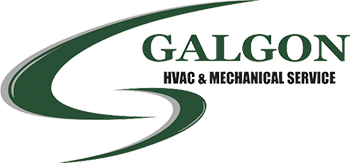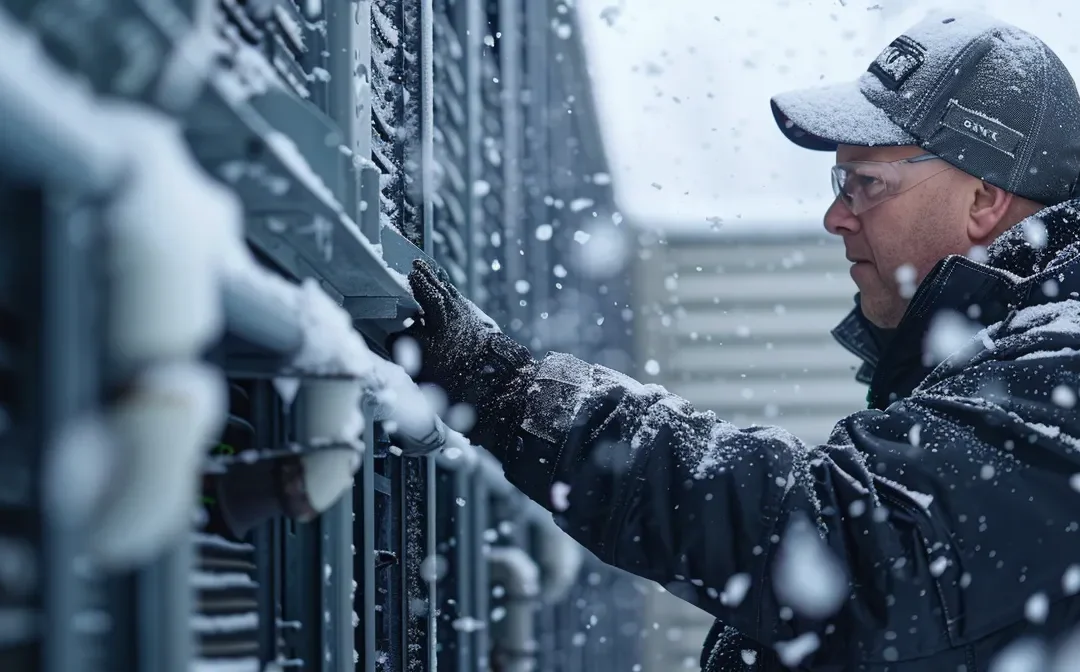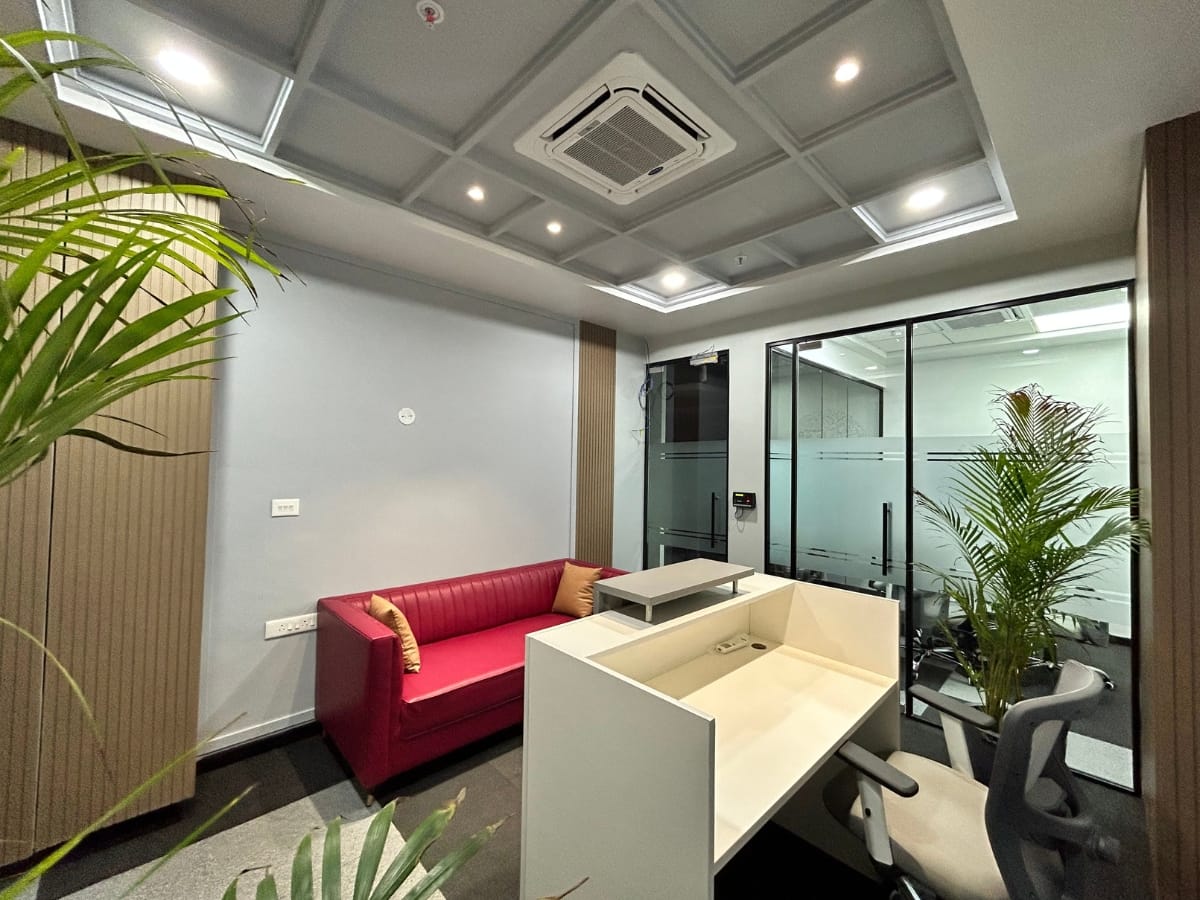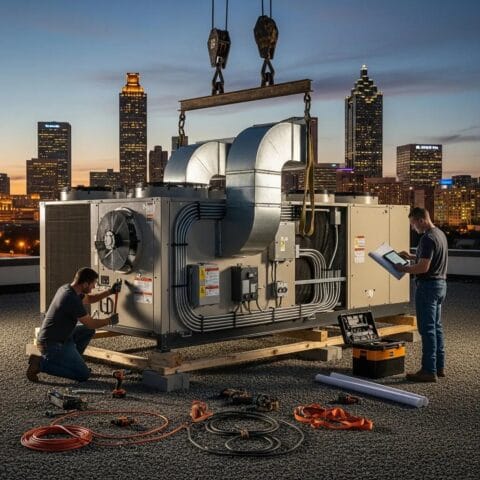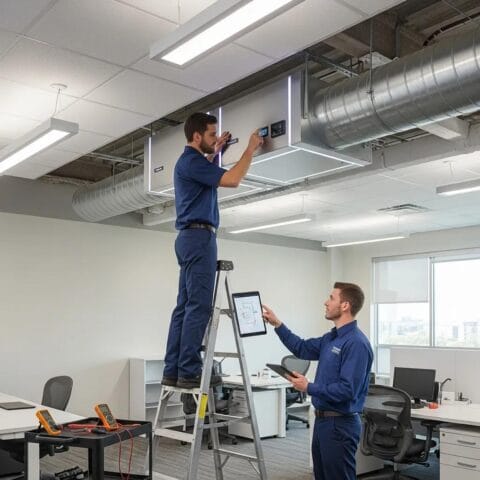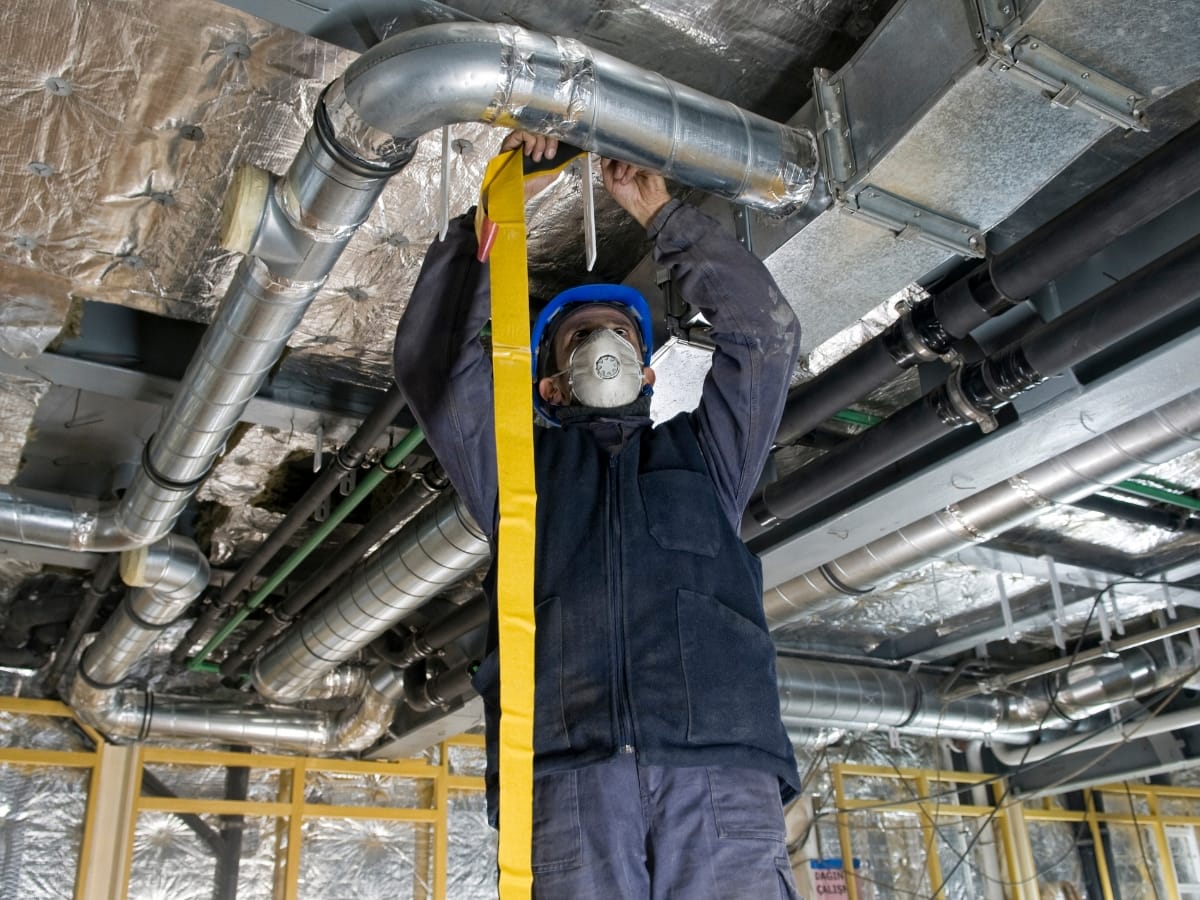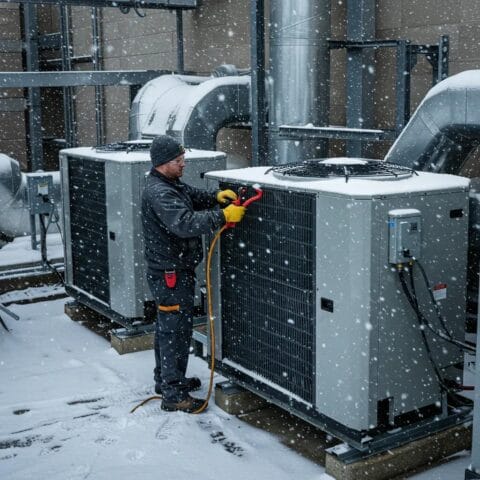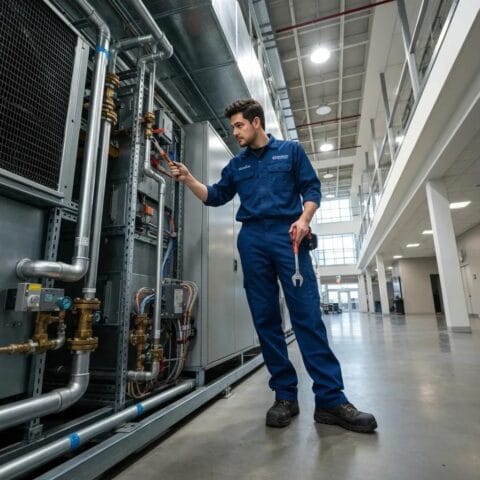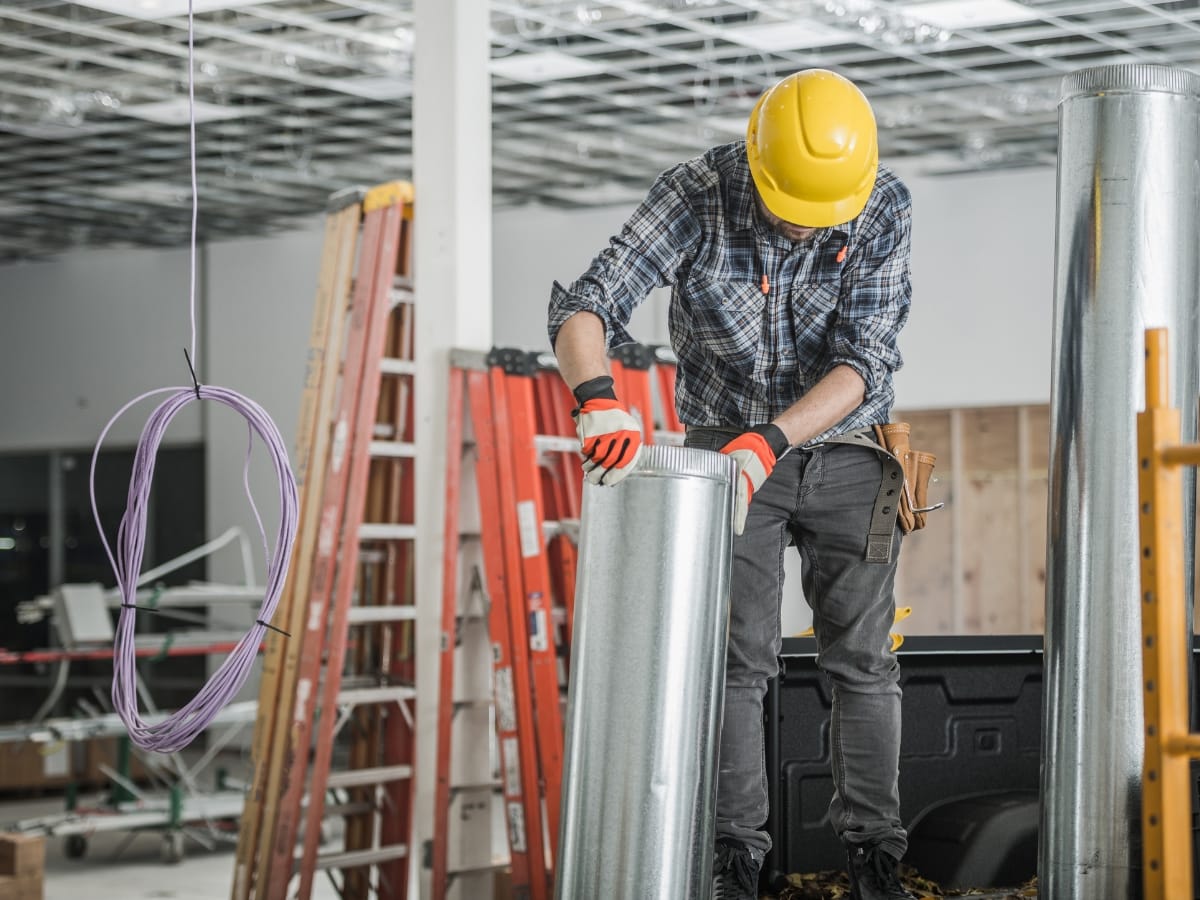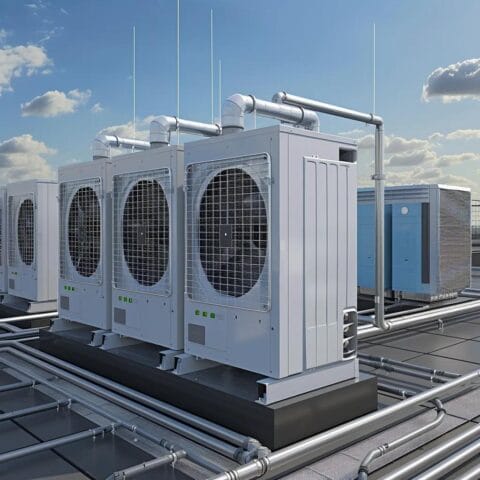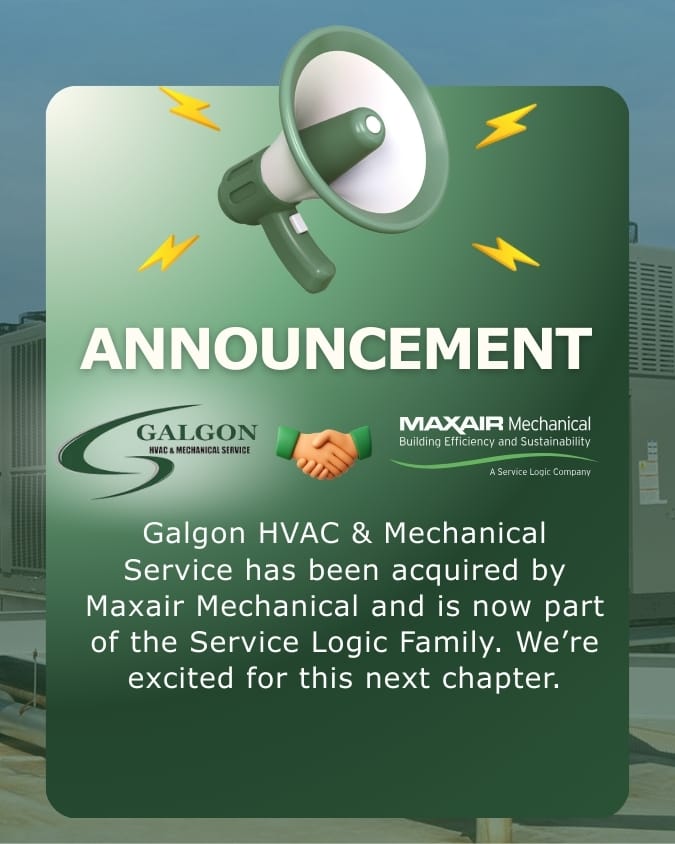As the chill of winter approaches, is your commercial HVAC system ready to handle the cold? This winter HVAC maintenance guide will walk you through the crucial steps to ensure your heating system runs efficiently, from checking your air filters to preventing leaks that can disrupt airflow.
You’ll learn how to prepare your HVAC system for winter‘s harsh conditions, follow an essential maintenance checklist, and implement a seasonal maintenance schedule.
By staying on top of these tasks, you’ll not only maintain a comfortable environment for your business but also save on energy costs. If you’re wrestling with inconsistent heating or concerned about the health of your HVAC system, the insights here will help you tackle those issues head-on.
The Ultimate Guide to Winter HVAC Maintenance for Property Owners
Key Takeaways
- Regular HVAC maintenance prevents costly repairs and system failures in winter
- Professional HVAC services ensure system efficiency and safety during cold months
- Empowering staff with basic HVAC maintenance skills can save time and reduce emergencies
- Adjusting maintenance schedules for high-traffic areas prevents overuse and maintains air quality
- Service contracts provide proactive care and quick responses to HVAC issues in winter
Understanding the Importance of Winter HVAC Maintenance for Commercial Businesses
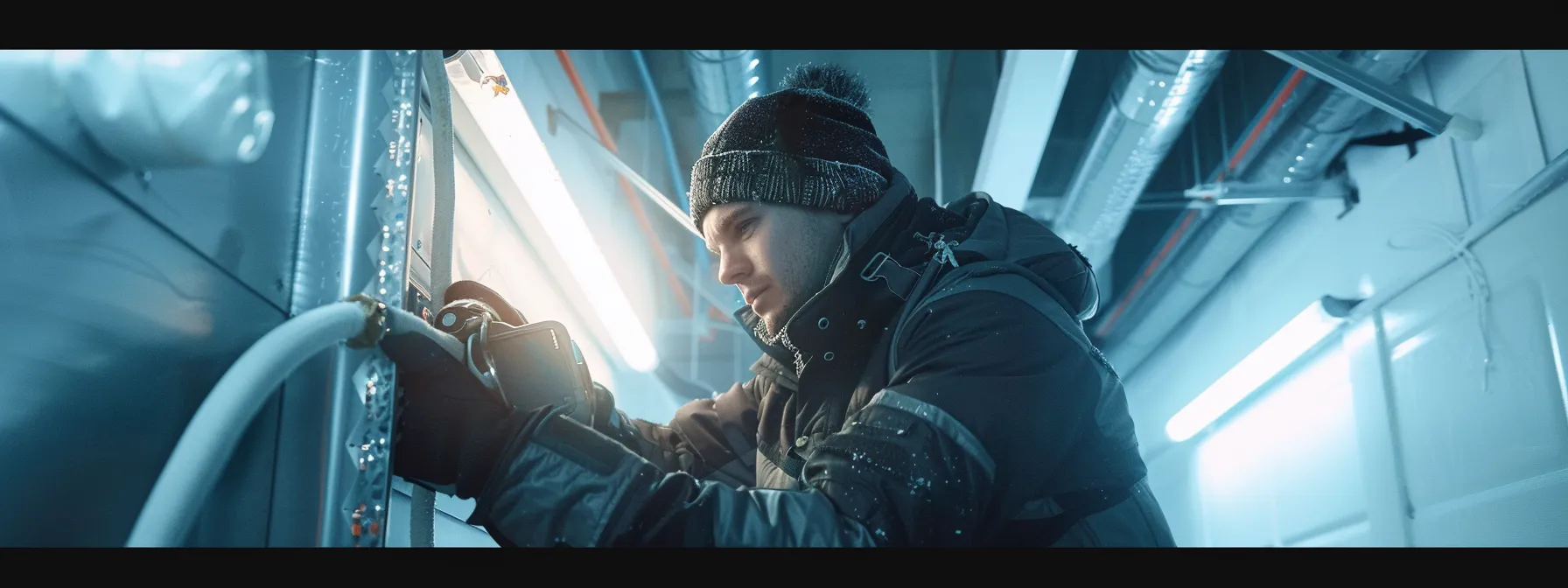
As winter rolls in, your HVAC system faces new challenges. The cold can take a toll on your air conditioning, heat exchanger, and thermostat, leading to unexpected downtime when you need heating the most.
This guide will walk you through a checklist to prevent these issues, ensuring your plumbing and commercial plumbing HVAC equipment run smoothly and last longer.
Let’s get your business winter-ready and avoid the seasonal headaches.
Effects of Cold Weather on Commercial HVAC Systems
When the temperature drops, your commercial HVAC system has to work overtime, which can spike your electricity bills and strain the system.
If the fluids inside your HVAC freeze, they can expand and cause significant damage to pipes and components, leading to costly repairs or water damage. It’s crucial for you to keep an eye on these preventative maintenance agreements to prevent a full-blown emergency during the coldest months.
Imagine walking into your business after a power outage to find your HVAC system has shut down, leaving you with an indoor climate that’s as chilly as the air outside. This scenario isn’t just uncomfortable; it can halt your operations and impact your bottom line.
Regular maintenance from Galgon HVAC can help you avoid these disruptions, ensuring your system is resilient against the cold and ready to handle an unexpected power outage with ease:
Preventing Unscheduled Downtime During Peak Season
When snow blankets the city, it’s not just the roads that need clearing; your commercial plumbing and HVAC system demands attention too.
A heavy snowfall can block exhaust vents, leading to dangerous carbon monoxide buildup inside your building. You’ve got to keep those vents clear to prevent a silent threat that could endanger your staff and customers, not to mention the potential for legal headaches if safety standards aren’t met.
Imagine a sudden thaw turning yesterday’s snow into today’s flood; water damage to your HVAC system is no joke. It’s not just about the immediate mess, but the long-term moisture can wreak havoc on your system’s components.
By scheduling regular preventative maintenance agreements check-ups, you’re taking a proactive step to shield your business from the chaos of water damage, ensuring your operations stay dry and uninterrupted no matter what the weather throws at you.
Extending the Lifespan of Your HVAC Equipment
When a winter storm hits, the last thing you want is for ice to wreak havoc on your HVAC system. Regular preventative maintenance agreements before the chill sets in can save you from the headache of insurance claims and emergency repairs.
By keeping your system in top shape, you’re not just ensuring warmth; you’re protecting your roof and the intricate machinery that keeps your business humming through the frosty months.
Think about it: a well-maintained HVAC system is less likely to succumb to the stresses of a storm. This means fewer disruptions in your daily operations and a longer lifespan for your equipment. Here’s what you should focus on to shield your system from the winter cold:
- Inspect and clean coils to prevent ice buildup.
- Check the roof unit for debris that could trap moisture and lead to ice damage.
- Review your insurance policy to ensure it covers winter-related HVAC damage.
By taking these steps, you’re not just dodging immediate troubles; you’re investing in the future of your business. A robust HVAC system is one less worry on your plate, letting you focus on what you do best: running your enterprise with confidence, no matter what the weather outside may be.
Winter‘s chill demands respect, especially for your commercial HVAC system. Let’s gear up to face the frost with confidence.
Preparing Your Commercial HVAC System for Winter Conditions
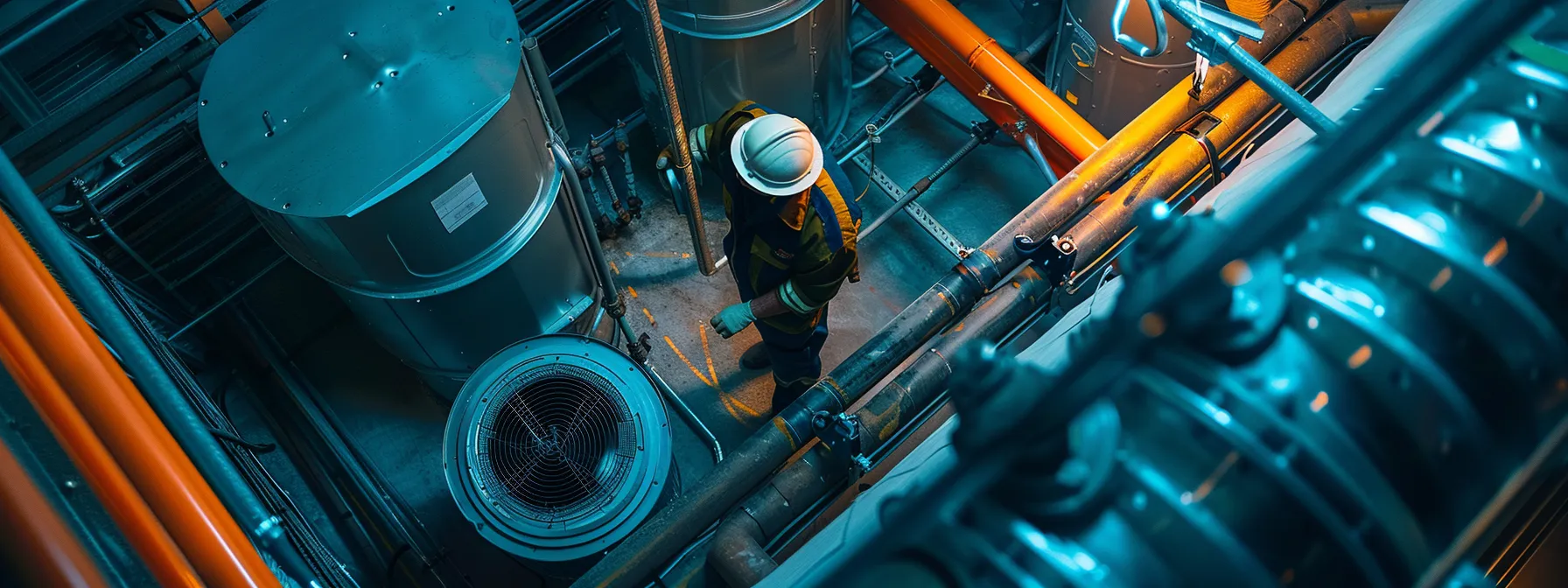
As the chill sets in, it’s time to focus on winterizing your commercial HVAC system. You’ll want to start with a thorough inspection of heating components for any wear and tear.
From the attic to the pump, and the condenser to the drainage, each step is crucial in keeping your space warm and your energy bills in check.
Inspecting Heating Components for Wear and Damage
Before the winter chill sets in, it’s crucial for you to inspect your heating components for any signs of wear and damage. Take a close look at your furnace, heat pump, and ventilation systems to ensure they’re in top-notch condition.
Spotting issues with refrigerant levels or wear on belts and motors early can save you from a cold surprise when temperatures plummet. Think of this step as your HVAC‘s personal survival kit against the harsh winter elements.
Regular checks on your commercial HVAC system can prevent the need for emergency repairs when you least expect it.
Paying attention to the little details, like unusual noises from the furnace or inconsistent heating, can be the difference between a minor fix and a major overhaul.
By keeping your heat pump and ventilation systems well-maintained, you’re setting up your business for a warm and worry-free winter season.
Cleaning and Replacing Air Filters and Coils
As you switch gears for winter, don’t overlook the basics: cleaning and replacing air filters and coils in your HVAC system. Clogged filters can choke your system‘s efficiency, forcing it to work harder and driving up energy costs.
A fresh filter, on the other hand, ensures optimal airflow and keeps your indoor air quality top-notch. Regular inspection of coils is just as crucial; when they’re clean, you prevent freezing that can damage the system and disrupt your business.
Think of your HVAC‘s flue and coils as the lungs of your building; they need to be clear to function at their best. During your pre-winter inspection, make sure these components are free from debris and damage.
This simple step can significantly boost your system‘s efficiency and longevity, keeping your space comfortably warm and your heating costs down:
- Inspect and clean the HVAC flue to ensure proper ventilation.
- Replace air filters to maintain clean airflow and efficiency.
- Check coils for signs of freezing or damage, and clean as needed.
Remember, a well-maintained HVAC system is your ally against the cold. By taking care of filters and coils now, you’re setting yourself up for a worry-free winter, with a warm, welcoming space for your customers and employees alike.
Sealing Ductwork to Improve Efficiency
When the wind howls and the temperature drops, the last thing you want is your HVAC system losing heat through leaky ducts.
Sealing your ductwork is like wrapping your building in a warm blanket, keeping the heat where it belongs and preventing hypothermia-inducing drafts.
This not only improves the efficiency of your system but also helps maintain a consistent humidity level, which is crucial if you’re using a humidifier to keep indoor air comfortable.
Think of duct sealing as a shield against severe weather, ensuring every corner of your commercial space stays toasty. It’s a simple fix: by sealing and insulating ducts, you’re preventing heat loss and making sure your HVAC doesn’t work overtime.
This means lower energy bills and a more reliable system that won’t leave you in the cold or scrambling to use your mobile phone to find an emergency repair service. Here’s how sealing your ductwork makes a difference:
Calibrating Thermostats and Control Systems
When you’re gearing up for winter, don’t overlook the heart of your HVAC system: the thermostat. A properly calibrated thermostat is like having the right tire pressure – it reduces the risk of wear and tear on your system and keeps your energy costs from inflating.
Especially if you’re using a programmable thermostat, make sure it’s set to match your business hours, so you’re not heating an empty space or, worse, letting the cold creep in when everyone’s working.
Think of calibrating your control systems as giving your HVAC a flashlight in the dark, cold winter. It guides your heating and cooling to work efficiently, cutting down on carbon emissions and energy waste.
If you’re not sure how to program your thermostat or if it’s reading accurately, it’s worth getting a professional to take a look. This simple step can keep your commercial space cozy and your mind at ease, knowing you’re not burning cash on a misaligned system.
Now that you’re aware of the importance of prepping your HVAC for the colder months, let’s roll up our sleeves. Here’s a checklist to ensure your system runs smoothly through winter‘s bite.
Essential Winter HVAC Maintenance Tasks Checklist
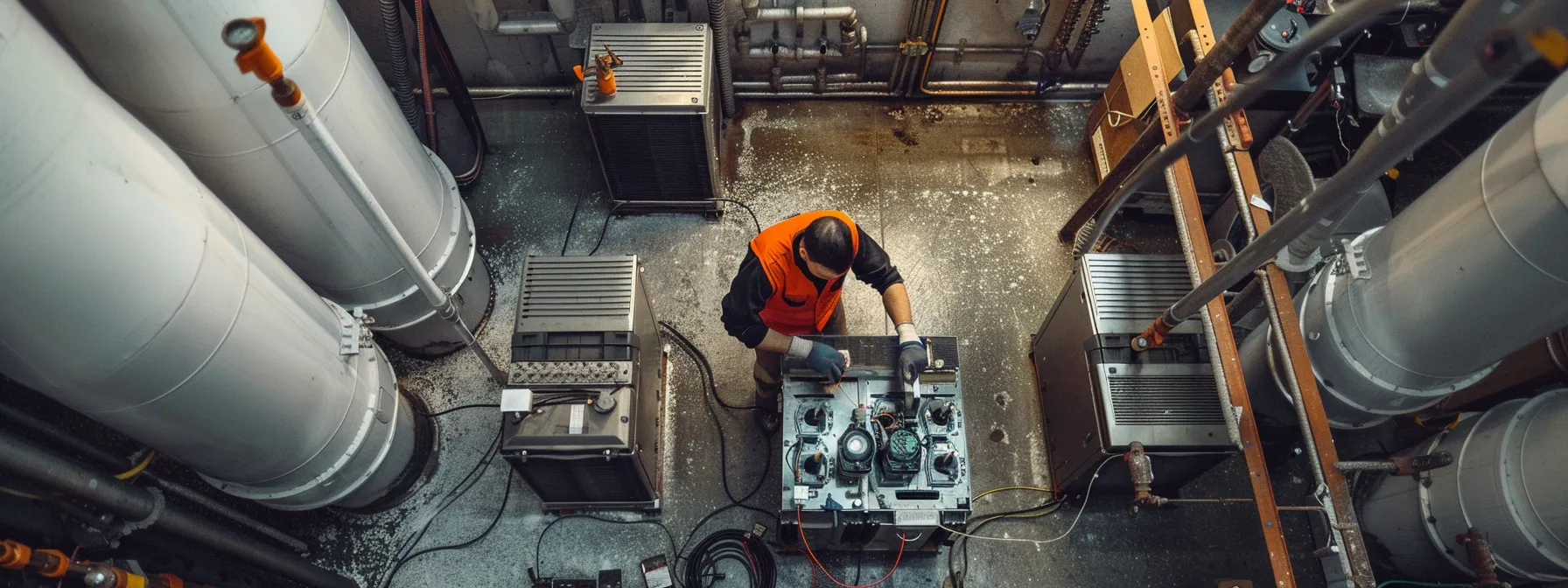
As you gear up for the colder months, it’s time to focus on the nuts and bolts of your commercial HVAC system. These steps are your blueprint for a warm, safe winter in your commercial space.
Lubricating Motors and Moving Parts
When the cold season approaches, it’s time to ensure your commercial HVAC system‘s motors and moving parts are well-lubricated. This simple step can prevent a lot of noise and wear that comes from the increased use during winter.
Proper lubrication keeps your system running quietly and efficiently, which means better indoor air quality and less dust circulating around your windows and workspace.
Think about the last time you heard a strange noise coming from your HVAC system. It’s often a sign that something’s not moving as smoothly as it should.
Regular lubrication helps avoid these noises and ensures that parts don’t grind together, which can lead to costly damage. Plus, it’s essential for the combustion components to work correctly, so you don’t end up with uneven heating or, worse, a system failure when you need it most:
Testing Safety Controls and Alarms
As you’re gearing up for the colder months, it’s crucial to test the safety controls and alarms of your heating system. A functional carbon monoxide detector can be the difference between a safe work environment and the dangers of carbon monoxide poisoning.
You want to ensure these systems are in top working order to protect your staff and customers from this invisible threat, especially since heating systems are in full swing during winter.
Don’t forget to check the evaporator and other components that could affect indoor air quality and potentially aggravate allergies.
Ensuring these parts are clean and functioning correctly helps prevent allergens from circulating through your space. It’s not just about warmth; it’s about maintaining a healthy environment where everyone can breathe easy and stay focused on the task at hand.
Verifying Proper Airflow and Ventilation
Ensuring your commercial space has proper airflow and ventilation is like making sure your stove has the right flame; it’s essential for both safety and energy conservation.
You don’t want winter debris clogging your commercial air handler. Regular checks can prevent this, keeping your system efficient and your indoor air quality high.
When you’re walking through your business, pay attention to how the air feels. If certain areas are stuffy or others too breezy, it might be time to have your ventilation system looked at.
A well-balanced airflow ensures that every corner of your space is comfortable, saving you from cranking up the heat and spiking your energy bills. It’s a simple step, but it’s one that can lead to significant savings and a happier, healthier environment for everyone in your building.
Checking Electrical Connections and Voltage
Before the winter rain starts to pour, it’s smart to check the electrical connections and voltage in your HVAC system.
Loose wires or a faulty valve can lead to more than just a system hiccup; they can cause serious issues like a breakdown during a frostbite-inducing cold snap. You wouldn’t head out into the cold without the right clothing, so make sure your HVAC isn’t left vulnerable to the elements either.
Think of your HVAC like a space heater that needs to be in tip-top shape to keep your commercial space cozy. A routine voltage check ensures that your system isn’t overworking itself, which can lead to wear and tear or even dangerous electrical issues.
By keeping an eye on these connections, you’re not just preventing potential problems; you’re ensuring that your business stays warm and productive all winter long.
Documenting Maintenance Activities for Compliance
Keeping a detailed log of your HVAC maintenance isn’t just about ticking boxes; it’s a critical step in ensuring your business stays on the right side of regulations. You know how a smoke detector needs a battery check to keep it beeping?
Well, documenting your HVAC checks is similar. It’s your proof that everything from the smart thermostat settings to the fuel levels has been reviewed and is in good working order, safeguarding you against compliance slip-ups down the road.
Imagine it’s inspection time, and you’re as calm as can be because you’ve got a complete record of every filter change, system calibration, and safety check. This isn’t just about peace of mind; it’s about having a solid defense if ever there’s a question about your building’s safety standards.
By keeping a meticulous record, complete with dates and details of tasks like testing the battery charger on backup systems, you’re not just prepped for winter—you’re set for success year-round.
You’ve checked off each task to winterize your HVAC system. Let’s keep that momentum and plan ahead for the changing seasons.
Implementing a Seasonal HVAC Maintenance Schedule

As the mercury dips and the threat of blizzards looms, it’s time to shield your commercial HVAC system from the wear and tear of freezing rain and plummeting temperatures.
Adjusting the maintenance schedule based on how much your system is running, from the tank to the chimney, will keep your business cozy and efficient all season long.
Planning Routine Inspections Before Temperature Drops
Before the chill of winter sets in, it’s wise for you to schedule routine inspections of your commercial HVAC system.
This is your HVAC‘s equivalent of a first aid check, ensuring that potential issues like a faulty pilot light or a gas leak are identified and fixed before they escalate.
It’s also the perfect time to test for monoxide levels and ensure your fireplace and other heating elements are ready to go, safeguarding your space against the silent threat of carbon monoxide poisoning.
Think of these inspections as a preemptive strike against the cold. You’re not just looking for obvious issues; you’re also ensuring that every component, from the pilot light to the gas lines, is in peak condition to handle the winter workload.
By doing so, you’re taking a crucial step to prevent unexpected breakdowns and maintain a warm, safe environment for your employees and customers:
- Check the pilot light and ignition systems for reliability.
- Test for carbon monoxide to prevent monoxide hazards.
- Inspect gas lines and connections to avoid potential leaks.
Coordinating With Professional HVAC Services
When the wind chill bites and your central heating system becomes your business’s lifeline, it’s time to call in the pros.
Coordinating with professional HVAC services ensures that every nook and cranny of your system, from the ducts sealed with caulk to the pilot light that keeps the fire burning, is ready to face the winter head-on.
They’ll have the expertise and the right tools, like a trusty radio for seamless communication, to keep your system humming through the frostiest days.
Remember, a stitch in time saves nine: regular check-ins with HVAC experts can prevent the kind of breakdowns that leave you out in the cold.
They’ll spot issues you might miss, like a hidden crack that could let in a draft, or a filter that’s past its prime. With their help, you can rest easy knowing your central heating will keep your space toasty and your energy bills from skyrocketing:
Training in-House Staff on Basic Maintenance
Empowering your team with the know-how to manage basic HVAC maintenance can be a game-changer, especially when facing the unpredictability of winter weather.
By training your staff to recognize early signs of a hazard, such as unusual humidity levels or the whiff of a gas leak, you’re setting up your business for swift emergency management. This proactive approach means you’re less likely to be caught off-guard by a climate curveball, like a sudden ice storm, ensuring your operations stay warm and uninterrupted.
Imagine your in-house team confidently handling routine checks, keeping an eye out for frost buildup or tweaking the thermostat to adapt to sudden temperature changes. This not only fosters a sense of ownership but also equips them to act quickly in case of minor issues, preventing them from snowballing into costly repairs.
With basic maintenance skills, your staff becomes your frontline defense against the cold, keeping your commercial space safe and comfortable all season long.
Adjusting the Schedule Based on Equipment Usage
As you gear up for winter, remember that your HVAC system‘s maintenance schedule should be as dynamic as the weather itself.
If your system is working overtime to keep up with the demands of a bustling commercial space, it might need more frequent check-ups to prevent issues like mold from damp air or restricted air flow from clogged filters.
Think of it as seasonal preparedness; just like you’d stock up on wood for a fireplace, you need to ensure your HVAC system is primed to handle the extra workload.
Adjusting your HVAC maintenance schedule based on equipment usage isn’t just smart; it’s essential for the longevity of your system. High-traffic areas can lead to faster accumulation of dust and debris, which means filters and coils may need more attention to maintain optimal efficiency.
By staying on top of these needs, you’re not only safeguarding against the chill, but you’re also ensuring that every breath of warm air is as clean and healthy as possible:
- Monitor high-traffic zones for increased dust and debris.
- Schedule additional filter checks and replacements as needed.
- Keep an eye on indoor humidity levels to prevent mold growth.
As your HVAC hums in tune with the seasons, it’s primed for the cold ahead. Let’s shift our focus to keeping that efficiency sharp as the winter winds blow.
Energy Efficiency Tips for Commercial HVAC Systems in Winter
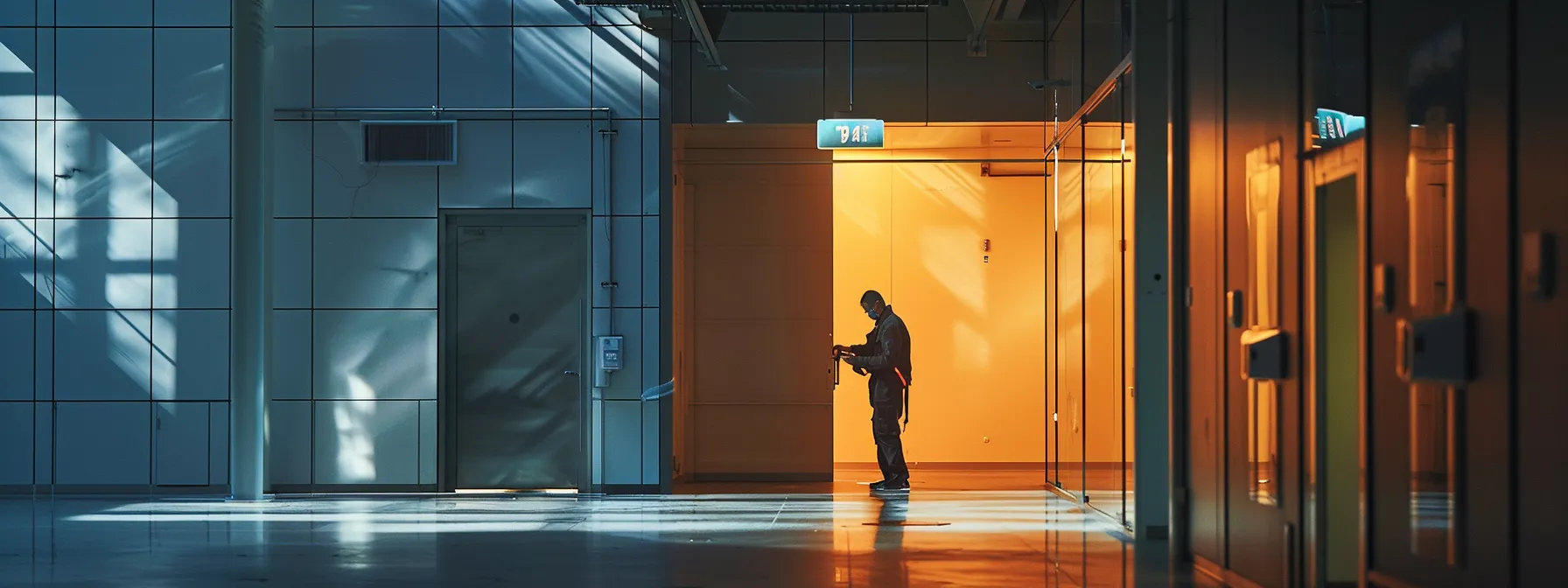
As you brace for winter, it’s crucial to focus on energy efficiency for your commercial HVAC systems. A savvy HVAC technician can help you optimize thermostat settings to cut costs without sacrificing comfort.
These steps, guided by a skilled HVAC contractor, can streamline your heating expenses and bolster your HVAC maintenance efforts.
Optimizing Thermostat Settings for Energy Savings
When the mercury dips, your HVAC system becomes your unsung hero, fighting off the cold air with gusto. But did you know that a simple tweak to your thermostat settings can lead to significant energy savings?
By setting your thermostat to lower temperatures when your commercial space is unoccupied, you’re not just cutting down on energy consumption; you’re also reducing the strain on your HVAC system, potentially decreasing the need for hvac repair services.
Let’s say you’re closing up shop for the night; there’s no need to keep the place toasty if no one’s around. Adjusting the thermostat to be cooler overnight can save you a bundle on heating costs.
Come morning, a programmable thermostat can bring the heat back up before you and your team arrive, ensuring a warm welcome without wasting energy. Here’s a quick rundown of steps to optimize your thermostat for winter hvac efficiency:
- Lower the thermostat during off-hours to save energy.
- Use a programmable thermostat to adjust temperatures based on your business schedule.
- Ensure your HVAC system maintains a consistent temperature to avoid overworking.
Utilizing Zoned Heating Strategies
When you’re prepping for winter HVAC maintenance, consider the strategic move of zoned heating. This approach allows you to heat specific areas of your commercial space as needed, reducing the strain on your system and potentially cutting down on heating repair costs.
By controlling the temperature in zones, you avoid wasting energy heating unused spaces, which is especially handy during the transition from winter to summer when needs can vary throughout your building.
Implementing zoned heating in your cooling system can lead to more than just immediate comfort; it’s a smart way to manage energy use throughout the seasons. Here’s how you can start optimizing your HVAC zones for better efficiency and comfort:
- Install thermostats in different areas to control the temperature based on occupancy and use.
- Adjust dampers within your ducts to direct airflow precisely where it’s needed.
- Regularly assess each zone’s performance to ensure optimal heating and identify areas that may need maintenance or repair.
Enhancing Building Insulation and Sealing Leaks
As you gear up for annual HVAC maintenance, don’t overlook the role of building insulation in your heating and cooling efficiency.
A well-insulated building retains heat during winter and keeps it out during summer, easing the workload on your air conditioner and heater. By sealing leaks around windows, doors, and ductwork, you’re not just preventing drafts; you’re also optimizing your HVAC system‘s performance and extending its lifespan.
When you check the thermostat, it’s a good moment to consider the overall envelope of your space. Insulation and sealing are like the gloves and scarf to your HVAC‘s winter coat; they’re essential for keeping the warm air in and the cold air out.
This proactive step can lead to lower energy bills and a more comfortable environment for your customers and employees:
- Inspect insulation in walls and attics to ensure it meets recommended R-values.
- Use weather stripping and caulk to seal gaps around doors and windows.
- Check ductwork for leaks and seal them to prevent loss of heated or cooled air.
Upgrading to High-Efficiency HVAC Equipment
Upgrading your commercial HVAC equipment to high-efficiency models is a smart move that can significantly reduce your seasonal HVAC maintenance and air conditioning repair costs.
These modern systems are designed to use less energy while maintaining optimal comfort levels, which means you’ll see a drop in your utility bills and a boost in your environmental credentials. Plus, with the latest hvac service technology, you’re less likely to face the disruptions that come with frequent equipment breakdowns.
Consider this: high-efficiency equipment often comes with advanced features that make air conditioning maintenance a breeze. You’ll benefit from improved air quality, quieter operation, and the peace of mind that comes from knowing your system is less prone to wear and tear.
Investing in these upgrades now could save you from the stress and expense of emergency air conditioning repair during the peak of winter, keeping your business running smoothly no matter the weather outside.
Monitoring Energy Consumption and Adjusting Practices
Keeping tabs on your energy consumption is like having a fire extinguisher on hand – it’s a crucial part of your safety and efficiency policy. You wouldn’t ignore a sputtering engine or overlook a soaked first aid kit, so don’t let your HVAC system guzzle more energy than necessary.
By monitoring usage patterns and adjusting your practices, you can keep moisture at bay, maintain air quality, and ensure your system isn’t working harder than it should. It’s a simple yet effective way to keep your energy bills from soaring and your equipment in prime condition.
Imagine you’ve just reviewed your energy statement and noticed a spike – that’s your cue to investigate and tweak your HVAC practices. Maybe it’s time to recalibrate your thermostats or seal up a few leaks that have been letting in drafts.
By staying vigilant and making adjustments as needed, you’re not just saving money; you’re also extending the life of your HVAC system and ensuring it runs efficiently, even when winter is at its peak.
Keeping your commercial HVAC system running efficiently is key, but sometimes it’s more than a simple fix. Let’s talk about when it’s time to call in the pros.
When to Seek Professional HVAC Assistance
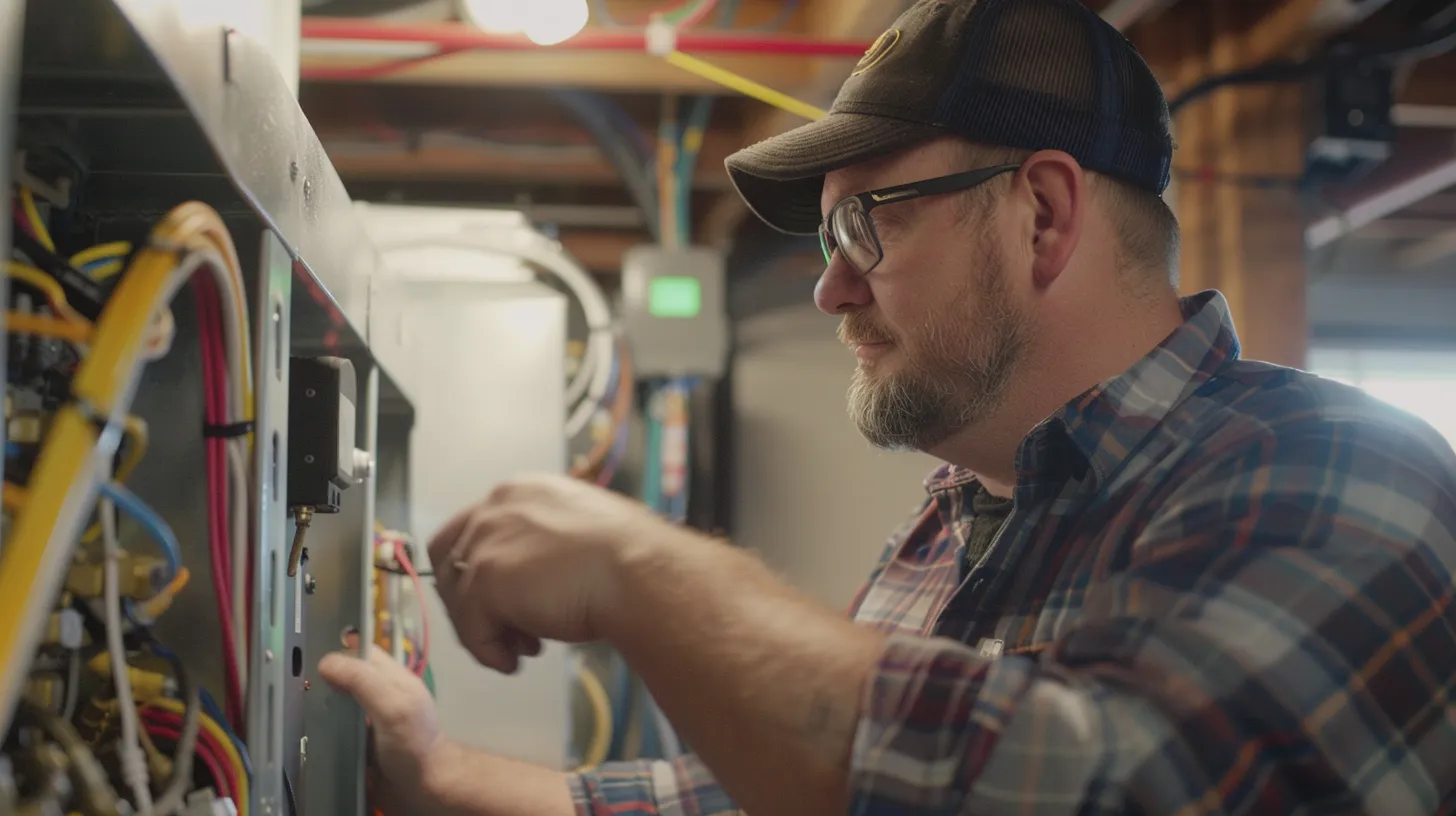
When your HVAC starts showing signs of wear or struggles under a winter weather advisory, it’s time to consider professional help. Let’s dive into when and why you should seek out the pros to keep your business warm and efficient all winter long.
Identifying Signs of System Malfunctions
If you’re noticing your property‘s heating feels as uneven as a desert landscape, with some rooms feeling like a sand dune at high noon and others more like a chilly night under the stars, it’s a sign your HVAC system might be malfunctioning.
This inconsistency can be a telltale sign that your system is struggling to distribute heat properly, which could mean anything from a simple filter issue to a more complex problem with the furnace or ductwork.
Another red flag to watch out for is a sudden spike in your natural gas bill, which can feel like you’re throwing money away like a blanket on a hot summer night. If your HVAC system is working harder than a camper trying to get comfy in a lumpy sleeping bag, it’s time to call in the pros.
They can pinpoint the issue, whether it’s a leak in your system or a need for a tune-up, ensuring your business stays warm and your heating costs don’t skyrocket.
Understanding the Limits of DIY Maintenance
While you might feel like a hero wielding duct tape, the truth is that DIY maintenance has its limits, especially when it comes to complex commercial HVAC systems.
You can certainly replace filters and clear away debris, but when it comes to the inner workings of your system, like addressing corrosion or ensuring proper cell operation, it’s time to hand the reins over to the professionals.
They have the tools and expertise to safely handle these intricate tasks, ensuring your system runs efficiently and reliably through the winter season.
Think of your HVAC system as if it were in the path of a tornado: it needs careful attention to withstand the harsh conditions. You wouldn’t patch up a storm shelter with tape; similarly, you shouldn’t expect quick fixes to suffice for HVAC maintenance.
Issues like electrical problems, refrigerant leaks, or ductwork damage require a skilled technician‘s touch. Their attention to detail can prevent small problems from escalating into full-blown emergencies, saving you time and money in the long run:
Scheduling Professional Inspections and Tune-Ups
When the chill of winter is nipping at your heels, it’s time to get your HVAC system‘s ventilator and compressor checked by the pros. Scheduling professional inspections and tune-ups can prevent the kind of HVAC hiccups that disrupt your business flow.
Think of it as giving your system a clear windshield and high visibility for the long, frosty months ahead, ensuring your ceiling fans and heating units work seamlessly to keep your space cozy and inviting.
Don’t wait until your HVAC system starts acting up, leaving you shivering in your office or dealing with foggy windows that obscure your view. Regular professional tune-ups can catch those sneaky issues that might not be obvious at first glance but can cause big problems down the line.
By staying on top of these appointments, you’re ensuring that every component, from the rooftop down to the basement, is in tip-top shape, ready to tackle whatever winter throws your way.
Planning for Emergency Repairs and Services
When extreme weather strikes, it’s like being caught in a snowstorm without a snow shovel – utterly unprepared. That’s why it’s essential for you to have a plan for emergency HVAC repairs and services.
Just as you’d stock bottled water for a natural disaster, having a trusted HVAC professional on speed dial ensures you’re ready to tackle any unexpected rust or system breakdowns.
A quick application of lubricant might silence a squeaky wheel, but for serious issues, you’ll want an expert who can swoop in and restore warmth to your business without delay.
Let’s face it, you can’t predict when your HVAC system might cry out for help, any more than you can foresee a pipe bursting in the dead of night. But you can be prepared. By establishing a relationship with a reliable HVAC service provider, you’re equipping your business with the equivalent of an emergency repair kit.
This proactive approach means that when the chill of a sudden freeze threatens your operations, you’re just a call away from a solution that will keep your commercial space cozy and functional, no matter what the weather outside may bring.
Evaluating Service Contracts for Long-Term Benefits
When winter‘s chill tests the limits of your commercial HVAC system, a service contract can be your safety net. It’s like having a dedicated technician on standby, ready to tackle any heat transfer issues or troubleshooting that goes beyond the scope of a quick circuit breaker reset.
Investing in a service contract means you’re looking out for your system‘s longevity, ensuring that when the cold bites, your business stays warm and operational without missing a beat.
Think of a service contract as your HVAC‘s personal health plan, with regular check-ups and preventive care to avoid the high costs of emergency repairs. It’s not just about having someone to call when the system acts up; it’s about proactive maintenance that keeps your equipment running smoothly through winter and beyond.
This way, you’re not left in the cold scrambling to find a fix when a technician‘s expertise is crucial for complex issues that arise.
Conclusion
Winter HVAC maintenance is crucial for commercial businesses to prevent costly breakdowns and ensure efficient operation during the coldest months. Ultimately, a well-maintained HVAC system is key to maintaining a warm, safe, and productive commercial space throughout the winter season.
Winter is the perfect time to ensure your commercial HVAC system is operating efficiently and reliably. By following proper maintenance tips, you can avoid costly repairs, ensure employee comfort, and maintain energy efficiency throughout the colder months.
At Galgon HVAC & Mechanical Service, we specialize in keeping your business warm and worry-free with our commercial HVAC services. Call us at (404) 352-1500 or put in a request for our services through our site form. Trust us to deliver top-notch service and customized solutions tailored to your HVAC needs.
